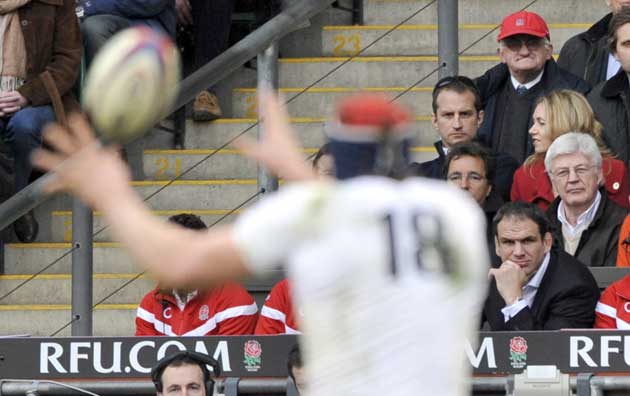Peter Bills: Modern rugby is like a chess game

Your support helps us to tell the story
From reproductive rights to climate change to Big Tech, The Independent is on the ground when the story is developing. Whether it's investigating the financials of Elon Musk's pro-Trump PAC or producing our latest documentary, 'The A Word', which shines a light on the American women fighting for reproductive rights, we know how important it is to parse out the facts from the messaging.
At such a critical moment in US history, we need reporters on the ground. Your donation allows us to keep sending journalists to speak to both sides of the story.
The Independent is trusted by Americans across the entire political spectrum. And unlike many other quality news outlets, we choose not to lock Americans out of our reporting and analysis with paywalls. We believe quality journalism should be available to everyone, paid for by those who can afford it.
Your support makes all the difference.You cannot argue with a try count of 5 to 2, and a score line of 34-10. But nor can you argue with a total nonentity of the modern game that was constantly in evidence at Twickenham on Sunday in the England v France match.
The failure of modern day players to understand the value of quick ball from the breakdown, frankly bewilders me. They stand there looking at the ball beneath their feet at the back of a ruck like some mother hen proud of the golden egg it has just laid.
There seems not a trace of understanding that speeding the ball down the back line represents one of the few chances of breaking modern defences. Didn’t England prove that by their first try after a French turnover?
If you can get the ball away from the breakdown at lightning pace, then you just about have a hope of escaping the suffocating blanket defences which blight the modern game, especially around the fringes.
But to see international players playing the game like it’s a chess contest – I’ll move my pieces here, you counter by moving yours there, then I’ll wipe out one of yours there and you then do likewise – is banal to me.
This is the rugby of the dinosaurs. When you go and watch Super 14 rugby in the southern hemisphere, as I have done these past few weeks, you understand why rugby south of the equator is dominant on the world stage.
The apologists for the northern hemisphere can say what they like but the facts destroy their arguments. Of the six World Cups, five of them have been won by southern hemisphere nations. Then there was an almost total wipe-out of the northern hemisphere countries in their own backyard last autumn by New Zealand, South Africa and Australia, Wales’s narrow win over the Wallabies excepted.
And one of the fundamental aspects of the southern hemisphere game is the pace at which the ball is re-cycled from the breakdown. It is seized, cleared and moved in an instant, invariably to players hitting the line at speed, not standing still and then having a think about where to go.
In the northern hemisphere, by utter contrast, there is a committee meeting held each time the ball carrier goes to the floor. We have the shenanigans of players diving off their feet over the top, players sealing off the opposition’s ball, slowing it down and, in effect, killing the attraction of the game.
Of course, when rucking was a legitimate activity in the game, you never had these problems, especially in a country like New Zealand. If you layed all over the loose ball at the breakdown in that land in those days, you risked emerging with one arm shorter than the other, or one half of your body with a few boot marks in it.
Disgraceful? You thought so at the time. But now I wonder. Fierce rucking for which the All Blacks in particular were renowned, meant the cheats trying to kill the loose ball, knew their fate. But the spectacle was so much better because the ball flowed from the breakdown.
Today, some players try and set up camp around the ball on the floor. Meanwhile, the backs hang about waiting for the ball like passengers hoping a bus might turn up sometime soon, without any realistic prospect of it arriving. By which time, of course, defences have been arranged as meticulously as the Chinese army.
I am hugely encouraged by the work Brian Smith is doing with England as their attack coach. In truth, England have had a rum season yet which country is top of the try scoring charts in the 2009 Six Nations? England, with 13.
That tells you something about what Smith brings to England. He’s a brilliantly inventive, shrewd, very aware technical and tactical coach. But he needs the rest of the England coaching staff to buy into his innovative ways.
I cannot believe for a moment that Brian Smith espouses a policy of standing looking at a ball at the back of the ruck for about two minutes, while the opposition calmly re-organises its defence. This has nothing to do with the modern game.
Clearing the ball out at pace is a quintessential requirement of modern rugby. It is axiomatic that every player understands this intrinsically.
Join our commenting forum
Join thought-provoking conversations, follow other Independent readers and see their replies
Comments